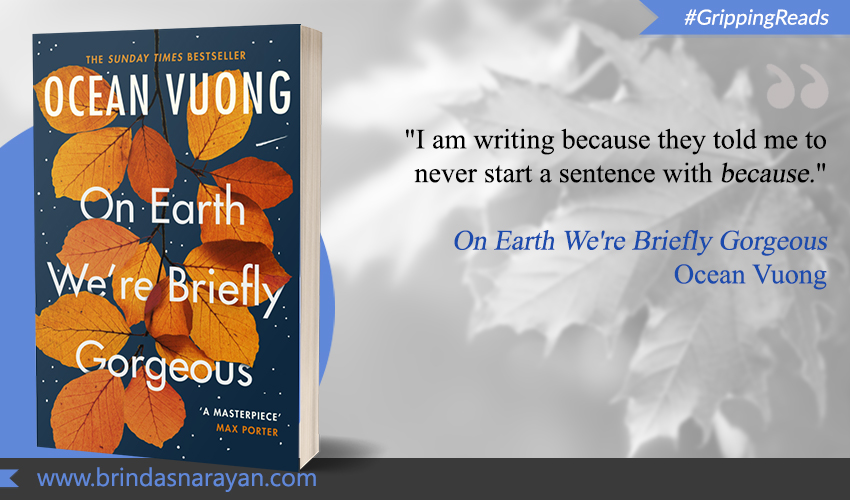
A Poetic Take on Coming of Age in America
This, to borrow a word from the title, is a gorgeous book. Gorgeous in the way Vuong’s words take flight, leaping from the light-filled memories of a child reading an ESL (English as a Second Language) storybook titled Thunder Cake to shockingly dark, hurtful ones. Like receiving at four-years-old, a stinging slap from his mother: “The first time you hit me, I must have been four. A hand, a flash, a reckoning. My mouth a blaze of touch.” That slap only portends deeper hurts to follow.
The whole work is written in the form of a letter. Ocean is not the first author to deploy an epistolary device to bare not just his raw feelings towards his loving but violent Mom, but also to dredge up all the experiences that have shaped him. And have forged his mother, Rose, and his grandmother, Lan. Because children harbor not only their memories, but also family traumas. Scars – physical and emotional – transmit across generations. One of the uncomfortable truths is that the mother cannot read this book or letter. English remains an alien language to her.
His grandmother named the protagonist Little Dog to protect him. A Vietnamese tradition secures little children by naming them after ghastly things: demons, monsters, piglets, “monkey-born, buffalo head, bastard.” To name him after something hateful and brutish is to love him deeply.
The book witnesses their immigration into the U.S. The ugly horrors and the palpitating hopes of mothers bearing infant children on their hips. Vuong threads the migration of humans with the flight of monarch butterflies. The latter are luckier. They are not held back by border checks, visas and passports. But apparently, butterflies that head south do not return to their place of origin. Only their children fly back; the future revisits the past.
In the U.S., Little Dog is raised in confined immigrant dwellings. Rose works at a chemical-drenched nail salon. Since the family cannot afford much, they dress to the tee when they visit the mall.
Even as she hears gunshots in the neighborhood, Lan asks Little Dog to pluck grey hairs from her head. To stop the itching, to look younger. Mundane human concerns throb below napalm-orange skies that fill her memories. Recalling, perhaps, the everydays of countries and people who have been at war for thirteen years: of how life goes on. In return, Lan tells him stories. Filling their walls with film-like images that teach the little boy to escape his horrific surroundings with words.
He gets bullied and beaten up on a school bus in America. For looking different, for not knowing English, for taking up space. His head is smashed against a window pane and he’s surrounded by young boys, who are already mimicking their sad, abusive parents: “He was only nine but had already mastered the dialect of damaged American fathers.” Little Dog submits, he has no choice. But the internal rage travels down, head to feet, from his leaky nose to his flashing shoes: “My sneakers erupted with silent flares: the world’s smallest ambulances, going nowhere.”
But eventually his English helps. After all, he can use a fistful of words to take on his bullies. Or anyone who might disparage or diminish his family. It’s a heavy burden, no doubt, to ferry words for the whole family. To rescue them from incomprehensible forces and a misunderstanding world: “I took off our language and wore my English, like a mask, so that others would see my face, and therefore yours.”
Despite bearing the weight of family expectations, Little Dog, a first-generation college goer, fritters his opportunity to get ahead. On an English degree. On uselessly burrowing his face among great books lining library shelves. On turning into a writer who captures the Vietnamese-American experience with particularity and precision.
But the work is not just about his origins or ethnic identity. But also about falling love with another boy, Trevor, whose grandfather hires Little Dog to work in tobacco fields. Trevor’s father seems mostly drunk, and is explicitly racist to the little “China boy.” All these rejections have to be borne amidst a more searing one: his own mother’s homophobia, or her incapacity to contend with his feelings. When he finally summons the courage to come out to Mom, she asks him if he plans to start wearing dresses. He even offers to run away, to leave her, to spare her the embarrassment.
But fortunately, she asks him to stay. And instead, she trades in her own secret. About Ocean having had an older “brother” – a kid who was aborted at four months. Because there wasn’t enough to go around, not enough to feed him.
It’s a poetic retelling of what might be considered a typical American story. Of an immigrant boy making his way through the mélange of colours and contradictions that stitch up the country. His sentences are slick and stunning, and he lays them out, word after sharp-edged word, like bricks. Despite an ex-President’s attempt to heighten or build walls, it’s writers like Vuong who puncture them with peep-holes. It’s up to us, readers, the world, to keep our gazes trained on the more shadowy corners.
References
Ocean Vuong, On Earth We’re Briefly Gorgeous, Vintage, Penguin Random House, 2019




